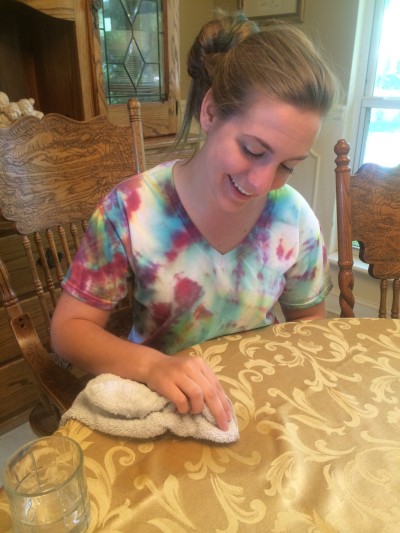When my oldest son John was two years old we were at a youth event at someone’s home. He spilled his drink on the floor in the kitchen. It amazed me that he quietly reached for a towel and cleaned up the mess all on his own. He’d been TRAINED AHEAD on how to handle a spill, keeping the goal in mind, which is simply to CLEAN IT UP, but to see it repeated in this context without supervision at his age, really showed me the FRUIT of this type of training.
Your children can do this too. It’s not a natural instinct, especially at that age. However, when you’ve TRAINED AHEAD, and when the GOAL of a spill makes sense to them, their reaction will be what you’ve taught them.
(pardon me for the reenactment with the wrong child, 22 years later)
So, here’s my tip… KEEP THE GOAL IN MIND. In this case, the goal is..
TO CLEAN IT UP…
without being told.
without bringing any attention to the spill or the process of cleaning it up.
Therefore, I believe as family members there might need to be some changes that WE NEED TO MAKE in order for this to happen.
1) Consider how YOU, as the parent, REACT. Does your reaction bring unwanted and needless attention…to the situation and the person who spilled the drink? Do you yell… or make a heavy SIGH… or belittle the child… or make it about YOU with a reaction like, “uhhhh.. I’m always cleaning up after you.” If ANY of these things apply to how YOU react, then YOU need to change. And the change needs to actually be to KEEP THE GOAL IN MIND.
Again, the goal in this case is… for the mess to be cleaned up… quickly and quietly.
2) So, TODAY… TRAIN AHEAD. Sit with your family at the table and ROLE PLAY:
- Say something like, “Okay kids, today I realized that I have OVERREACTED to many things that are so unimportant, and I want us to role play HOW we will handle things like this in the future. I have handled it wrong and want to show you what I will be doing now, and I want YOU to see how to handle this too.”
- Side note: Talking like this with your children demonstrates a TEACHABLE HEART on your behalf, and a desire to continue to grow and learn in life! AND, it makes their hearts safe at home – they will be more apt to be open with you, sharing real feelings, because you are demonstrating that you’re not “always aright.”
- “Let’s say a glass spills. We will all react calmly, and whoever did it will just simply, quietly, get up and go get a towel” (or whatever you use.)
- ” We’ll have no facial expressions, sighs, not make fun of anyone, but simply focus on the goal… which is to clean it up.”
- “If you’re talking and you’re the one who spills it, keep talking… get up… get the towel… come back… clean it… while talking.”
- “If you’re not the one talking and, the person talking spilled it, you can quietly say- showing RESPECT to them…’I’ll get that. You keep sharing…'” and then while keeping your head kind of focused on the person sharing, go get the towel, clean it, dispose of the towel and then sit back down and continue engaging in conversation.”
- “If this happens to a guest at our home, the same thing applies – YOU get up and clean it, with no reaction except to calmly, quietly clean it, keeping the focus on the conversation NOT the spill. THIS respect will ensure that the guest will feel comfortable in our home. “
- “This shows PEOPLE OVER THINGS.”
- After explaining this, then role-play it. Pretend to be talking, actually knock over a small glass of water and have people act out the scenario.
Rhonda THISonechangeinYOURreactionwillhelpwithaPEACEFULhome ellis



I started out doing this and then got lost along the way when my life got uberhectic. But this is great advice!!!
Terri, I think this is true of all of us as parents from time to time. The good news is we can get right back on track when we realize it. I had to do that with discipline with one of my children when her older sibling came back in town from college. Funny thing is she said, “You are more consistent when he comes to town” I said, “You’re right,” then asked her, “Do you like it better when I’m more consistent?” She said, “Yes.” Isn’t that crazy that I forget that they NEED and LIKE to have boundaries that, in this case, resulted in self-control.